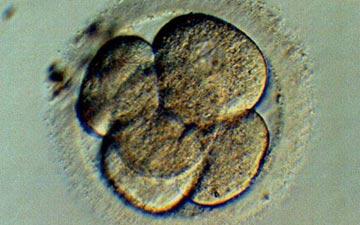
Ethical concerns over scientific advances
(AP Photo/photo supplied by Bourn Hall Fertility Clinic, Findlay Kember)
Patricia Fachin, journalist with the Instituto Humanitas Unisinos in Brazil, recently interviewed Brian Green, assistant director of Campus Ethics at the Markkula Center for Applied Ethics. The views expressed are his own. In several postings, we will share some highlights of the interview. The full interview can be found, in Portuguese, at the IHU website. In this first part of the interview, Fachin asks Green about the genetic modification of embryos.
How did you receive the news that the first attempt at creating genetically modified human embryos was made by scientists of the Oregon Health and Science University in the US?
Unfortunately, in our current cultural context, I thought that this event was regretfully inevitable. It was bound to happen somewhere in the world. It surprised me somewhat that is was in the US.
What are, in your view, the moral problems involved in this kind of research?
Although tiny, an embryo is a human life. We all began our lives as embryos, and yet now, never facing that condition again, we feel free to destroy that which we once were. This is an injustice, to deny to one group of humans what we ourselves were once given. Additionally there is another problem; instrumentalizing human lives wholly for the sake of benefiting others, while destroying those being subjected to research, is dehumanizing and unjust. Such research not only harms the human lives destroyed in the research, but also damages the character of those committing the actions.
Has research both on genetically modified human embryos and the development of artificial intelligence been followed by ethics committees? What do these committees discuss about the development of that research?
Formal committees (IRBs - Institutional Review Boards) are probably involved in some of the choices involved with embryo research, at least in the US. Some corporations investigating AI also have an interest in ethics. But for the most part, that I know of, ethicists often act outside of the system, individually, or in ethics center such as my own: the Markkula Center for Applied Ethics at Santa Clara University. This is not unexpected: being an ethicist means being a critic, judging actions and telling people things they might not want to hear. And critics who are not outside of a system often get captured by the system and have their judgments bent to the will of their employers, even if only subtly. We need outside, unbiased institutions where ethicists can have free discussions on today's issues with less influence from money or other causes of corruption.
Besides the discussion about the genetic modification of human beings and the development of artificial intelligence, what are in your view the current problems related to the various areas of science for which philosophy must provide an urgent response? In this sense, how should we bring philosophy and the other sciences closer to each other?
We should come to recognize that we have choices in the technologies that we develop. We do not need to have nuclear weapons on Earth, for example. We could have international treaties against them, as we do against poisoned bullets, blinding lasers, chemical weapons, biological weapons, and an assortment of other inhumane methods for killing people. Philosophers and theologians should get active in questions of the morality and governance of the powerful new technologies we are developing, or else we will have these technologies and, like children with guns, start to play with them. We cannot afford to merely "play" with AI or synthetic biology or self-replicating nanotechnology. We need international treaties to coordinate worldwide governance over these technologies, or we will open a Pandora's Box of problems we cannot solve, and which may destroy civilization.
